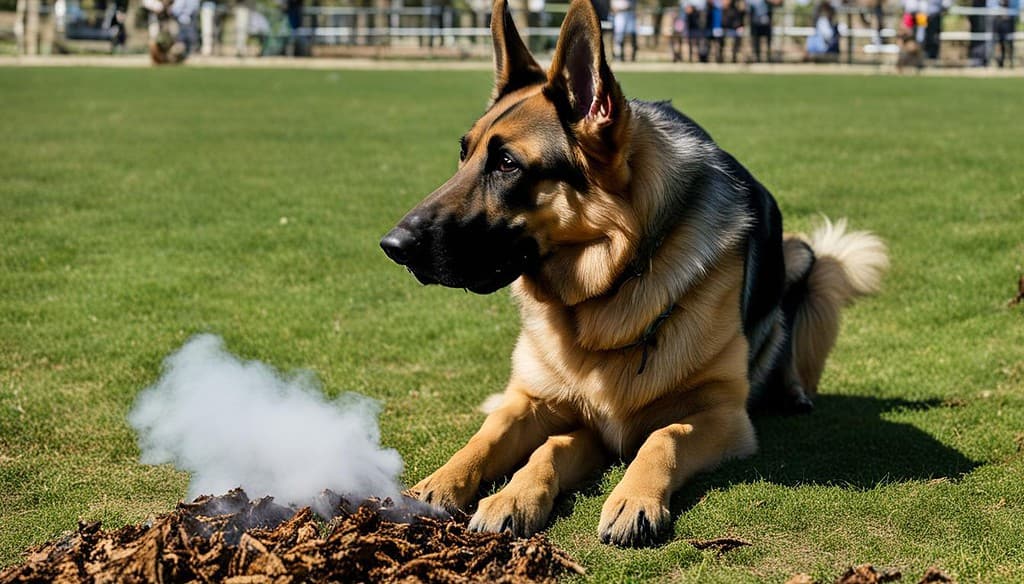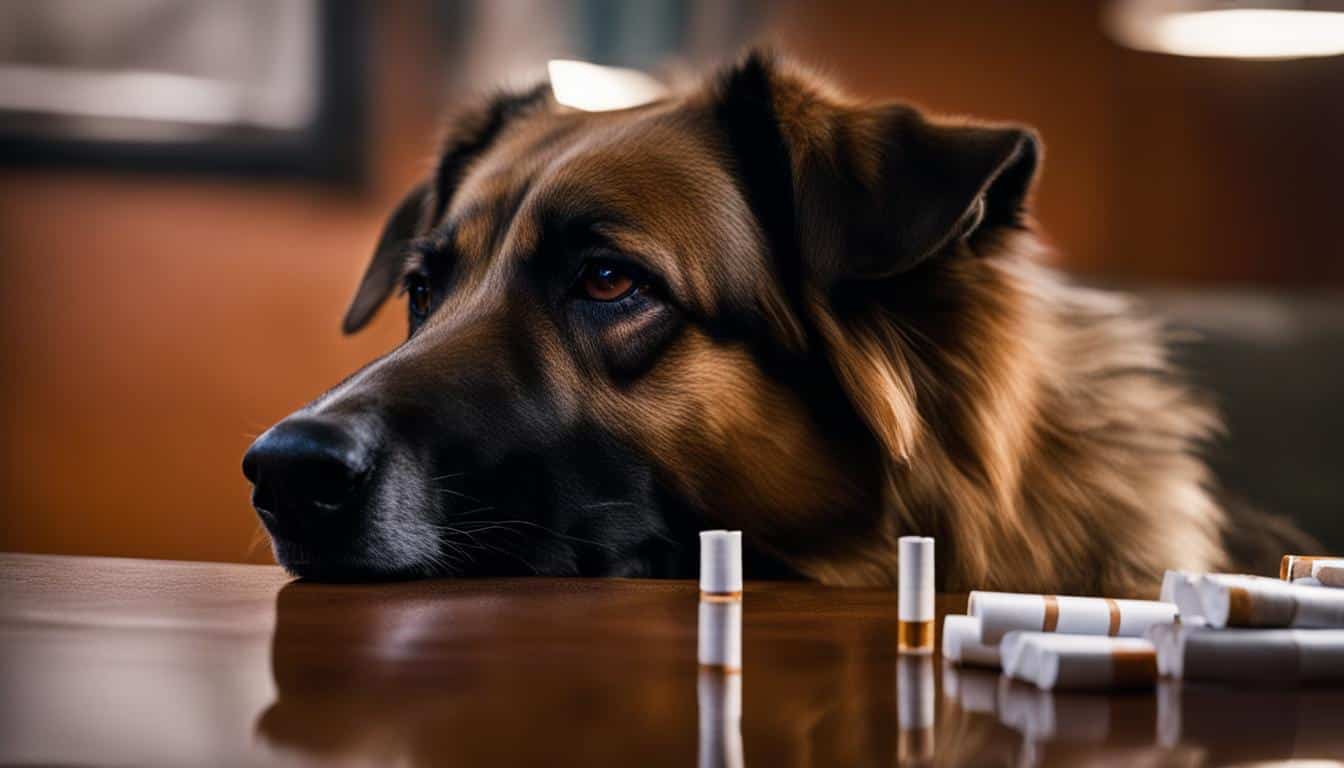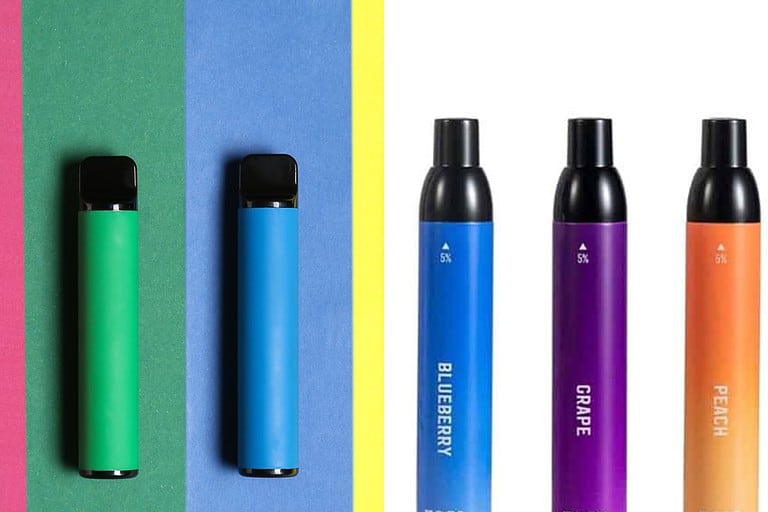Can Drug Dogs Detect Nicotine? Find Out Now.
Dogs are known for their incredible sense of smell, which is up to 10,000 times more sensitive than humans. While drug-detection dogs are primarily trained to detect illicit substances, some people may wonder if they can also detect nicotine. In this article, we will explore the topic of drug dogs and their ability to detect nicotine. Whether you’re concerned about canine drug detection for nicotine or simply curious about nicotine detection by drug dogs, we have the answers you’re looking for.
Table of Contents
How Drug Dogs Detect Substances
Drug dogs play a crucial role in detecting narcotics and illegal drugs. Their remarkable sense of smell allows them to locate and identify these substances with impressive accuracy. But how exactly do drug dogs detect these illicit substances?
To train drug dogs, handlers use a method called scent detection training. The training process involves teaching dogs to associate the scent of different substances with specific behaviors or physical signals. Here’s an overview of how drug dogs are trained to detect substances:
- Basic Commands: Drug dogs are initially taught basic commands using positive reinforcement. This establishes a foundation for further training and ensures that dogs respond reliably to their handlers’ commands.
- Pseudonarcotics: Once dogs have mastered basic commands, they are exposed to pseudonarcotics. Pseudonarcotics are substances that have smells similar to controlled drugs. By training with pseudonarcotics, dogs learn to differentiate the smells of different substances.
- Alerting Behaviors: As dogs become familiar with the smells of specific substances, they are trained to exhibit alerting behaviors when they detect those scents. This could include barking, pawing, or sitting down to signal to their handlers that they’ve found the target scent.
While drug dogs are primarily trained to detect illicit drugs, they can also pick up on the scent of nicotine if they have been specifically trained to do so. The incredible olfactory abilities of drug dogs make them valuable assets in various law enforcement and security operations.
Signs Dogs Can Smell Nicotine
Dogs have an incredible sense of smell, making them highly adept at detecting various scents. When it comes to nicotine, dogs exhibit distinct signs that indicate their ability to detect its presence. Paying attention to these signs can help you determine whether a dog has picked up on the scent of nicotine:
Behavioral Signs:
- Staring at the source of the scent
- Being alert and attentive
- Pacing or restlessness
- Sniffing intensely in an area
- Freezing the body and maintaining a tense jaw
- Raising a paw or having ears up
Excited Behavior:
If a dog detects nicotine, they may exhibit excited behavior such as:
- Acting aggressively or excessively hyperactive
- Circle around the source of the scent
- Display focused attention on the area
- Touching their nose to the object emitting the nicotine odor
These behaviors are indicative of a dog’s ability to smell nicotine and react to its presence. Dogs’ keen sense of smell enables them to detect even trace amounts of the scent, making them useful in various detection tasks.
The Science Behind Dogs’ Sense of Smell
Dogs have an extraordinary sense of smell that sets them apart from humans. With 300 million olfactory receptors in their noses, dogs have a much more sensitive sense of smell compared to humans, which only have around 5 million receptors. This means that dogs can detect scents that are far too subtle for us to notice.
One of the reasons dogs have such a keen sense of smell is their specialized organ called the vomeronasal organ, or Jacobson’s organ. This organ enhances their ability to detect and analyze various scents. It’s located in the roof of their mouth and is connected to the nasal cavity. When dogs encounter a scent, they often open their mouths slightly and curl their lips to allow air to pass over this organ, which helps them gather more information about the scent.
In addition to their advanced olfactory system, dogs also have a larger area of the brain dedicated to analyzing smells. This allows them to process scents in a way that humans cannot. Dogs can differentiate between different odors, even those that seem similar to us. This is why drug dogs can identify specific substances, such as nicotine, among a variety of other scents.
Dogs vs. Humans: A Scent Comparison
| Species | Number of Olfactory Receptors | Size of Olfactory Bulb (Brain Area) |
|---|---|---|
| Dogs | 300 million | Larger |
| Humans | 5 million | Smaller |
The table above compares the number of olfactory receptors and the size of the olfactory bulb in dogs and humans. As you can see, dogs have a much larger number of receptors and a bigger olfactory bulb, which explains their exceptional ability to detect and analyze scents. The greater number of receptors allows dogs to pick up low concentrations of odors, and the larger olfactory bulb gives them the capacity to differentiate between various scents.
Training Drug Dogs to Detect Nicotine
While most drug dogs are not specifically trained to detect nicotine, it is possible to train them for this task. Private organizations and some customs agencies have trained dogs to detect tobacco and nicotine products, including e-cigarettes and nicotine gum.
Dogs can be trained to associate the scent of nicotine with a specific behavior or physical signal, just like they are trained to detect other substances.
“Training drug dogs to detect nicotine can be a valuable tool in situations where the detection of tobacco or nicotine products is necessary.”
However, it is worth noting that the majority of drug dogs are not trained to detect nicotine due to the legality of tobacco and nicotine products.
| Pros | Cons |
|---|---|
| Dogs can be trained to detect nicotine if needed. | The majority of drug dogs are not specifically trained to detect nicotine. |
| Their incredible sense of smell makes them highly effective in detecting a wide range of substances. | The legality of tobacco and nicotine products may impact the training focus of drug dogs. |
| Nicotine detection can be a valuable tool in situations where the detection of tobacco or nicotine products is necessary. | Training drug dogs to detect nicotine may require additional resources and specialized training programs. |
Drug Dogs and Vape Carts
Drug dogs possess an extraordinary olfactory sense and can theoretically detect the scent of vape cartridges containing THC extract. Their highly attuned sense of smell allows them to pick up a wide range of odors. However, drug dogs are primarily trained to detect illegal drugs, and the detection of vape carts is not a common task for them.
At airports, drug dogs are typically trained to detect explosives rather than substances like nicotine or vape carts. This specialized training makes it unlikely for a drug dog to specifically alert to a vape cart containing nicotine or THC.
Table: Comparison between substances commonly detected by drug dogs and vape carts.
| Substances Detected by Drug Dogs | Can Drug Dogs Detect Vape Carts? |
|---|---|
| Marijuana | No |
| Cocaine | No |
| Heroin | No |
| Methamphetamine | No |
| Explosives | No |
| Vape Carts | Unlikely |
Based on their training, drug dogs are primarily focused on detecting illegal drugs and explosives rather than vape carts. Therefore, the chances of a drug dog specifically alerting to a vape cart containing nicotine or THC are low.
Drug Dogs and International Travel
Drug dogs play an essential role in international airports for customs purposes, contributing to the detection of illicit substances. While drug dogs are commonly used in international airports, their presence in domestic airports in the United States is primarily focused on bomb detection rather than drugs. However, it is important to note that drug laws and regulations vary between countries, and some countries may have stricter regulations regarding nicotine or tobacco products.
Travelers should be aware of the regulations of the specific country they are visiting to ensure compliance and avoid any issues with drug detection dogs. Understanding the rules and restrictions surrounding nicotine and tobacco products can help ensure a smooth and hassle-free travel experience.
Conforming to Different Countries’ Regulations
When traveling internationally, it is crucial to research and familiarize oneself with the drug-related laws and regulations of the destination country. Some countries have strict regulations on nicotine or tobacco products, and the possession or importation of these substances may be prohibited or heavily restricted.
Here are a few key points to consider:
- Research the specific country’s laws and regulations regarding nicotine or tobacco products.
- Check if there are any restrictions on carrying nicotine products, such as e-cigarettes, vape pens, or tobacco.
- Understand the limitations on the quantity of nicotine or tobacco products that can be brought into the country.
- Ensure that any nicotine or tobacco products comply with labeling requirements and packaging restrictions.
- Consider alternative options or cessation aids if traveling to a country with strict regulations on nicotine products.
Precautions to Take
While drug detection dogs may primarily focus on detecting illicit drugs, their sensitive sense of smell can detect the presence of nicotine or tobacco products if they have been trained accordingly. To avoid any complications or delays during international travel, consider the following precautions:
- Check if the airport or country has any designated smoking areas or restrictions on smoking.
- Follow all customs and security procedures regarding the declaration of nicotine or tobacco products.
- Ensure that all nicotine or tobacco products are properly sealed and stored in accordance with regulations.
- Consider contacting the embassy or consulate of the destination country for specific guidance on nicotine or tobacco regulations.
By being aware of the regulations and taking necessary precautions, travelers can have a smoother travel experience and avoid any issues with drug detection dogs or customs authorities.
Reducing the Odor of Vape Carts

If you want to reduce the odor of vape cartridges and minimize the chances of drug dogs detecting them, there are some measures you can take. Keeping the end of the cart capped with a silicone cap can minimize the aroma. Storing the cart in an airtight container, such as the original packaging or a sealed plastic container, can also help reduce the smell. Avoiding using the vape cart before traveling can prevent it from smelling stronger. Additionally, packing the vape cart within other items can further reduce the aroma.
When it comes to reducing the odor of vape carts, taking precautions and using proper storage methods can make a significant difference. By following these tips, you can minimize the scent and decrease the likelihood of detection by drug dogs.
“Keeping the end of the cart capped with a silicone cap can minimize the aroma. Storing the cart in an airtight container, such as the original packaging or a sealed plastic container, can also help reduce the smell. Avoiding using the vape cart before traveling can prevent it from smelling stronger. Additionally, packing the vape cart within other items can further reduce the aroma.”
Tips for Reducing the Odor of Vape Carts:
- Keep the end of the cart capped with a silicone cap to minimize the aroma.
- Store the cart in an airtight container, such as the original packaging or a sealed plastic container, to reduce the smell.
- Avoid using the vape cart before traveling to prevent it from smelling stronger.
- Pack the vape cart within other items to further reduce the aroma.
By implementing these strategies, you can take proactive steps to reduce the odor of vape carts and decrease the chances of detection by drug dogs.
Dogs and Nicotine Smell Concealment
When it comes to detecting the presence of nicotine, drug dogs truly have an incredible sense of smell. The strong odor of tobacco can easily be picked up by these highly trained canines, even if the nicotine has been concealed. While drug dogs aren’t foolproof and may occasionally miss certain scents, the probability of them detecting the smell of nicotine through a car is high. Their exceptional olfactory abilities make it challenging to hide the odor of tobacco products from these diligent sniffers.
In a closed environment like a car, the scent of tobacco can linger and permeate different surfaces, making it difficult to completely conceal. The odor molecules can stick to upholstery, clothing, and other materials present in the vehicle, increasing the chance of detection by drug dogs. Even if attempts are made to mask or hide the smell, these highly trained canines can still alert to the presence of nicotine.
“Drug dogs have an exceptional ability to detect various substances, including nicotine. Despite attempts to conceal the scent of tobacco, these diligent canines can still pick up on the odor and react accordingly.”
It is important to remember that drug dogs go through extensive training to recognize and indicate the presence of specific substances. Their keen sense of smell, combined with their training, enables them to effectively detect the odor of nicotine, making it difficult to conceal the scent in a car.
Although drug dogs can sometimes miss certain scents, it is always best to assume that they can detect the smell of nicotine. Taking proper precautions and following regulations regarding tobacco products can help avoid any potential issues with these highly skilled dogs.
Training Dogs to Smell Tobacco

Dogs possess an incredible ability to detect and identify the scent of tobacco, including cigarettes and other nicotine-containing products. Through a systematic training process, these intelligent canine companions can be taught to recognize and indicate the presence of tobacco odor. The training methodology involves associating the distinct scent of tobacco with positive reinforcement, such as a toy or a treat.
During the training sessions, handlers utilize objects like towels that have been exposed to tobacco scent to acquaint the dogs with the specific aroma. By repeating this process and reinforcing the correct behavior, dogs gradually learn to associate the smell of tobacco with a rewarding outcome. With consistent training and reinforcement, dogs develop the capability to locate and respond to the scent of tobacco.
The training process not only hones the dogs’ olfactory senses but also strengthens their bond with their handlers. It is a collaborative effort that cultivates trust, obedience, and the ability to discern specific scents in a controlled environment.
Training Dogs to Smell Tobacco – Step by Step
- Introduce the scent of tobacco to the dog using a towel or other objects.
- Associate the presence of the tobacco scent with positive reinforcement, such as a toy or a treat.
- Repeat the training sessions, gradually increasing the complexity and duration.
- Reinforce the correct behavior consistently to solidify the connection between the tobacco scent and the reward.
- Provide ample opportunities for the dog to practice locating and indicating the presence of tobacco.
- Evaluate the dog’s progress and make necessary adjustments to the training regimen.
By following this systematic approach, dogs can be trained to reliably detect and respond to the scent of tobacco. Their remarkable olfactory abilities, combined with a well-structured training program, make them effective assets in detecting the presence of tobacco and assisting in various practical applications.
| Benefits of Training Dogs to Smell Tobacco | Challenges in Training Dogs to Smell Tobacco |
|---|---|
| – Dogs can swiftly and accurately detect tobacco in various settings. | – Training requires dedicated time and effort from both the dog and handler. |
| – They can assist in locating hidden or concealed tobacco products. | – Training must be reinforced consistently to maintain detection accuracy. |
| – Dogs provide a non-invasive method of detecting the presence of tobacco. | – Environmental factors can impact the dog’s ability to distinguish tobacco scent. |
| – They can help enforce regulatory compliance in areas where tobacco use is prohibited. | – Dogs must be trained specifically for tobacco detection to minimize false alerts. |
| – Dogs can aid in preventing tobacco-related risks and promote a healthier environment. | – Regular training and evaluations are necessary to maintain proficiency. |
Dogs possess an unparalleled ability to discern and respond to various scents, including the distinct odor of tobacco. Through a structured training program, these remarkable animals can be effectively utilized in detecting tobacco presence, ensuring compliance, and mitigating associated risks.
Dogs’ Sense of Smell and Substance Detection
Dogs possess an exceptional sense of smell, making them invaluable in the field of substance detection. Not only can they be trained to detect drugs like nicotine, but they can also identify explosives, cancer, and other substances of interest.
The training process for substance detection in dogs involves associating specific scents with a reward system and reinforcing the correct behavior. By using positive reinforcement techniques, dogs learn to recognize and respond to the scent they have been trained for, whether it’s a controlled substance or a particular odor associated with cancer detection.
It’s worth noting that different dog breeds may have varying levels of sensitivity to certain scents. For example, some breeds are known for their keen ability to detect drugs, while others excel in sniffing out explosives. However, with proper training and reinforcement, any dog can be trained to detect substances.
By leveraging their extraordinary sense of smell and trainable nature, dogs play a crucial role in various fields, from law enforcement to medical research. Their olfactory capabilities provide valuable insights and assistance in detecting substances that would otherwise go undetected by humans.
Benefits of Using Dogs for Substance Detection
There are several benefits to utilizing dogs for substance detection:
- Accuracy: Dogs have a remarkable ability to detect even trace amounts of substances, providing highly accurate results.
- Efficiency: Dogs can search large areas quickly and efficiently, saving time and resources.
- Non-invasive: Unlike certain detection methods that require invasive procedures, dogs can identify substances without physical contact.
- Portable: Dogs are mobile and can be deployed to various locations, making them versatile in different environments.
- Reliability: With proper training and handling, dogs are reliable in detecting substances, ensuring consistent results.
By harnessing the power of their sense of smell, dogs continue to prove themselves as indispensable allies in substance detection.
| Benefits | Description |
|---|---|
| Accuracy | Dogs possess a remarkable ability to detect even trace amounts of substances, providing highly accurate results. |
| Efficiency | Dogs can search large areas quickly and efficiently, saving time and resources. |
| Non-invasive | Unlike certain detection methods that require invasive procedures, dogs can identify substances without physical contact. |
| Portable | Dogs are mobile and can be deployed to various locations, making them versatile in different environments. |
| Reliability | With proper training and handling, dogs are reliable in detecting substances, ensuring consistent results. |
“The extraordinary sense of smell possessed by dogs makes them invaluable in substance detection, helping in various fields such as law enforcement and medical research.”
Conclusion
Drug dogs possess extraordinary olfactory abilities, enabling them to detect a wide array of substances, including nicotine. While these highly trained canines are not typically specialized in nicotine or tobacco detection, they are still capable of detecting the scent of these substances. Although it is possible to train drug dogs to specifically detect nicotine, most are primarily trained to detect illicit drugs.
For travelers, it is essential to remain aware of the regulations pertaining to nicotine and tobacco in the countries they plan to visit. Taking appropriate precautions can help avoid any potential issues with drug detection dogs. Understanding that drug dogs have the ability to detect nicotine, travelers should ensure they comply with the specific regulations and guidelines regarding the possession and transportation of nicotine-related products.
In conclusion, drug dogs play a critical role in substance detection due to their remarkable sense of smell. While their capabilities extend to nicotine detection, their focus remains predominantly on illegal drugs. By staying informed and adhering to the applicable laws, travelers can mitigate any concerns related to drug detection dogs during their journeys.
FAQ
Can drug dogs detect nicotine?
While most drug detection dogs are not specifically trained to detect nicotine, they have the ability to pick up on the scent of a wide range of substances, including illicit drugs. However, their training primarily focuses on detecting illegal substances rather than nicotine.
How do drug dogs detect substances?
Drug dogs are trained to associate the scent of specific substances with certain behaviors or physical signals. They are initially taught basic commands using positive reinforcement and are then exposed to pseudonarcotics that have smells similar to the controlled substances they are being trained to detect. The dogs learn to differentiate these smells and alert their handlers accordingly.
What are the signs that dogs can smell nicotine?
Dogs may exhibit signs such as alert behavior, staring, pacing, sniffing, body freezing, tense jaw, raised paw, and ears up when they detect the scent of nicotine. They may show excited behavior, circle around the source of the scent, display focused attention, or touch their nose to the object emitting the odor.
How does dogs’ sense of smell work?
Dogs have an extraordinary sense of smell due to their 300 million olfactory receptors in their nose, which is about 10,000 times more than humans. They also have a specialized organ called the vomeronasal organ, which enhances their sense of smell. Dogs can analyze scents in a way that humans cannot, thanks to their 220 million scent receptors and a larger part of the brain dedicated to analyzing smells.
Can drug dogs be trained to detect nicotine?
While most drug dogs are not specifically trained to detect nicotine, it is possible to train them for this task. Private organizations and some customs agencies have trained dogs to detect tobacco and nicotine products, including e-cigarettes and nicotine gum. Dogs can be trained to associate the scent of nicotine with specific behaviors or physical signals, similar to how they are trained to detect other substances.
Can drug dogs smell vape carts containing nicotine or THC?
Drug dogs are primarily trained to detect illegal drugs, and the detection of vape carts is not a common task for them. While they have the ability to smell a wide range of odors, the chances of a drug dog specifically alerting to a vape cart containing nicotine or THC are low.
Do drug dogs detect nicotine at airports?
Drug dogs are commonly used in international airports for customs purposes, where their main focus is on detecting illicit substances. The use of drug dogs at domestic airports in the United States is less common, with a primary focus on detecting bombs rather than drugs. It is essential for travelers to be aware of the regulations regarding nicotine and tobacco in the countries they visit.
How can the odor of vape carts be reduced?
To minimize the smell of vape cartridges and reduce the chances of drug dogs detecting them, you can cap the end of the cart with a silicone cap and store it in an airtight container such as the original packaging or a sealed plastic container. Avoiding using the vape cart shortly before traveling and packing it within other items can also help reduce the aroma.
Can drug dogs smell nicotine through a car?
Drug dogs have an exceptional sense of smell, and the strong smell of tobacco can easily be detected by them. Even if nicotine has been concealed, there is still a chance that a highly trained drug dog may alert to its presence.
How are dogs trained to smell tobacco?
Dogs are trained to detect tobacco, including cigarettes and other nicotine-containing products, by associating the scent of tobacco with a positive reward, such as a toy or treat. Handlers use towels or objects to introduce the scent of tobacco and teach the dog to locate and indicate its presence. Repetitive training and reinforcement help dogs learn to recognize and respond to the scent.
How does dogs’ sense of smell assist in substance detection?
Dogs’ exceptional sense of smell and their ability to be trained make them valuable tools in substance detection. Dogs can be trained to detect not only nicotine but also explosives, cancer, and other substances of interest. Different breeds may have different levels of sensitivity to certain scents, but any dog can be trained to detect substances with proper training and reinforcement.







